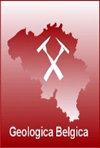北海盆地南部渐新世沉积物中的构造和气候信号(Ernest Van den Broeck 2016年获奖讲座)
IF 0.7
4区 地球科学
Q2 GEOLOGY
引用次数: 4
摘要
渐新世沉积物形成于比利牛斯和萨维亚构造脉冲之间。渐新世早期以广泛的浅水海侵为特征。全球变冷与随后的海洋退缩同时发生,这也是大Coupure动物群更替的时间。在鲁伯利期,不断的海侵导致了Boom粘土的沉积。Boom Clay的水深高频旋回变化是由冰块的盛衰驱动的,而低频旋回则可能是构造信号。鲁伯利期末期,垂向构造差异导致坎平沉降区西部和南部沿海地区东部较浅的水深受到较大侵蚀。下莱茵河地堑的沉降在Chattian期开始时恢复。海只能短暂地侵过地堑外,但在地堑内保存了较厚的夏天沉积。在地堑外,侵蚀在Chattian和Aquitanian时期继续占主导地位。这种长时间的海平面以上是由于萨维亚构造隆起脉冲和全球低海平面的结合。本文章由计算机程序翻译,如有差异,请以英文原文为准。
Tectonic and climatic signals in the Oligocene sediments of the Southern North-Sea Basin (Ernest Van den Broeck medallist lecture 2016)
The Oligocene sediments formed between the Pyrenean and Savian tectonic pulses. The earliest Oligocene was characterized by a widespread shallow water transgression. Global cooling coincided with the subsequent retreat of the sea which is also the time of the Grande Coupure faunal turnover. Renewed stepwise transgression resulted in the deposition of the Boom Clay during the Rupelian. High-frequency cyclic changes in water depth of the Boom Clay are driven by waxing and waning of ice masses while lower-frequency cycles can be tectonic signals. By the end of the Rupelian, differential vertical tectonics resulted in considerable erosion west of the Campine subsidence area and in shallower water depth in the eastern part of the southern coastal area. Subsidence of the Lower-Rhine graben resumed at the start of the Chattian. The sea could only briefly transgress over the area outside the graben but in the graben thick Chattian sediments are preserved. Outside the graben, erosion continued to dominate during the Chattian and the Aquitanian. This long period above sea level is due to a combination of the Savian tectonic uplift pulse and a global low sea level.
求助全文
通过发布文献求助,成功后即可免费获取论文全文。
去求助
来源期刊

Geologica Belgica
地学-地质学
CiteScore
4.70
自引率
27.80%
发文量
8
审稿时长
>12 weeks
期刊介绍:
Geologica Belgica is a Belgian journal that welcomes papers concerning all aspects of the earth sciences, with a particular emphasis on the regional geology of Belgium, North West Europe and central Africa. Papers not dedicated to the geology of Belgium, North West Europe and central Africa are only accepted when one of the authors is linked to a Belgian University or Institution. Thematic issues are highly appreciated. In this case, guest editors take in charge the selection of the manuscripts and the subject of the papers can be enlarged. The journal is in open access.
Submitted manuscripts should be concise, presenting material not previously published. The journal also encourages the publication of papers from Belgian junior authors. Short letters are accepted. Papers written in English are preferred. Each mansucript will be reviewed by at least two reviewers.
 求助内容:
求助内容: 应助结果提醒方式:
应助结果提醒方式:


